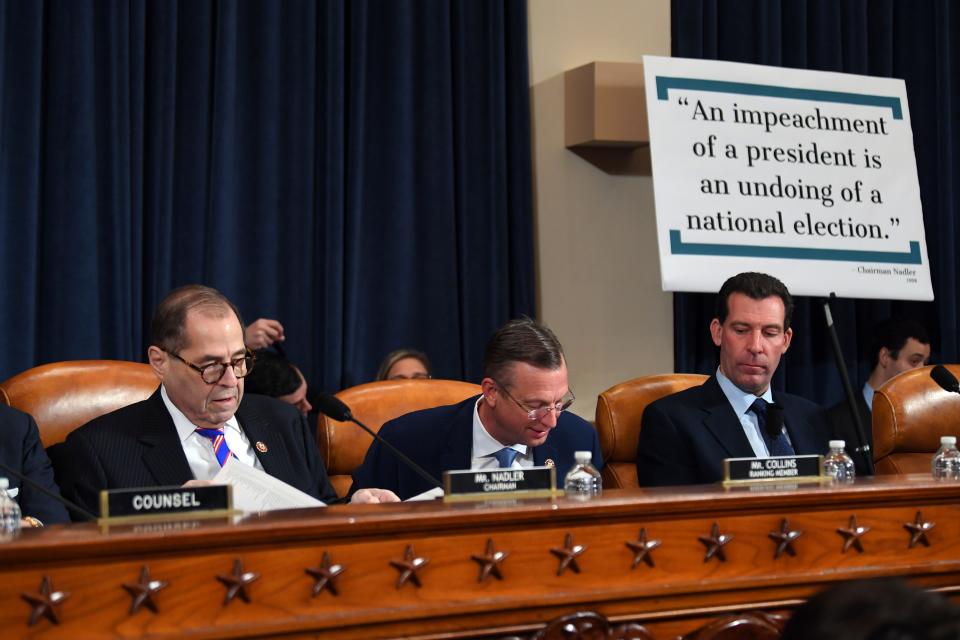'High crime' or 'railroad job'? Combative hearing explores whether Trump committed impeachable acts
WASHINGTON – A trio of law professors told the House Judiciary Committee on Wednesday that President Donald Trump committed impeachable offenses in urging Ukraine to investigate his political rival Joe Biden.
But Trump called the impeachment hearing "a joke." Republican lawmakers complained that Democrats were railroading the panel to rubber-stamp the investigations of other committees. And the lone GOP witness, another law professor, said the process was moving too fast while facts were disputed and more evidence could still be gathered.
The hearing provided a legal analysis from the academics of the 300-page report released Tuesday that found Trump used “the powers of his office to solicit foreign interference on his behalf in the 2020 election.” Republicans released a minority report Monday defending the president as doing nothing wrong.
The Democratic report from the House Foreign Affairs, Intelligence, and Oversight and Reform committees said Trump withheld official acts such as a White House meeting and $391 million in military aid to compel Ukraine to investigate Biden, the former vice president, and his son Hunter.
“The evidence of the President’s misconduct is overwhelming, and so too is the evidence of his obstruction of Congress,” the report said.
Judiciary Chairman Jerry Nadler, D-N.Y., said Trump personally solicited foreign interference in the 2016 and 2020 elections, was caught both times and then tried to prevent the American public from finding out about it.
"Never before has a president engaged in a course of conduct that included all of the acts that most concerned the framers" of the Constitution," Nadler said. "The patriots who founded our country were not fearful men. They fought a war. They witnessed terrible violence. They overthrew a king. But as they met to frame our Constitution, those patriots still feared one threat above all: foreign interference in our elections."

Noah Feldman, a professor at Harvard University, said Trump’s July 25 call with Ukraine President Volodymyr Zelensky was enough to impeach the president for soliciting the investigation of his political rival for his own personal political advantage.
“This act on its own qualifies as an impeachable high crime and misdemeanor,” Feldman said.
Michael Gerhardt, a law professor at the University of North Carolina, said Trump’s conduct merited impeachment to prevent future presidents from seeking foreign help.
“If what we’re talking about is not impeachable, then nothing is impeachable,” he said.
Republicans have argued that Trump eventually met with Zelensky and released the funding without any announced investigations. But Gerhardt said people who failed to get away with their misconduct were still impeached.
The point of impeachment is “to catch that person, charge that person, ultimately remove that person from office,” Gerhardt said.
Pamela Karlan, a professor at Stanford Law who said she represented the committee under both Republicans and Democrats in voting rights cases before the Supreme Court, said "drawing a foreign government into our election process is an especially serious abuse of power because it undermines democracy itself."
"That demand constituted an abuse of power," Karlan said.
Trump described the report as "a joke" while he continued to attack Democrats and the House hearing during a NATO-related meeting in London.
"It’s really, honestly, it’s a disgrace,” Trump said. Impeachment is "a dirty word" that should "only be used in special occasions,” he added.
Trump called Intelligence Chairman Adam Schiff, D-Calif., a “stone-cold loser” and again questioned the patriotism of Democrats.
"You almost question whether or not they love our country, and that's a very serious thing,” Trump said. “Do they love our country?"
Schiff received a standing ovation Wednesday after delivering a presentation to the House Democratic Caucus on the report released Tuesday, according to a senior Democratic aide.
House Speaker Nancy Pelosi, D-Calif., talked about the gravity and somber nature of the moment, according to the aide. She said the members must reach their own conclusions and decide how to respond one step at a time, according to the aide.

But the top Republican on the Judiciary Committee, Rep. Doug Collins of Georgia, said the calendar was driving the Democratic impeachment effort. He said the haste left the panel to rubber-stamp the report from other panels rather than gather its own evidence.
“This is not an impeachment,” Collins said. “This is a simple railroad job.”
Republicans sought votes on postponing the meeting until Dec. 11 and on calling Schiff and the anonymous whistleblower who complained about Trump's call to Zelensky as witnesses. But Democrats tabled each of the proposals on party-line votes of 24 to 17.
Rep. James Sensenbrenner, R-Wis., demanded a Republican hearing on the impeachment inquiry, a move that Nadler said he would consider. But Collins said Nadler couldn’t shut down such a hearing with a vote.
The Republican witness, Jonathan Turley, a law professor at George Washington University, said he doesn’t support Trump and voted against him. But Turley, who testified 20 years ago on the history of impeachment during the investigation of former President Bill Clinton, said the abbreviated inquiry for Trump was “problematic and puzzling” because of the incomplete record and witnesses who weren’t yet subpoenaed.
“What we leave in the wake of this scandal will shape our democracy for decades to come,” Turley said.
Turley said he saw no obvious violations of law in the House report, as defined by the federal courts.
“If you can’t make out those crimes, what’s the point?" Turley asked.
Contributing: Courtney Subramanian
This article originally appeared on USA TODAY: Impeachment hearing explores whether Trump committed 'high crimes'

